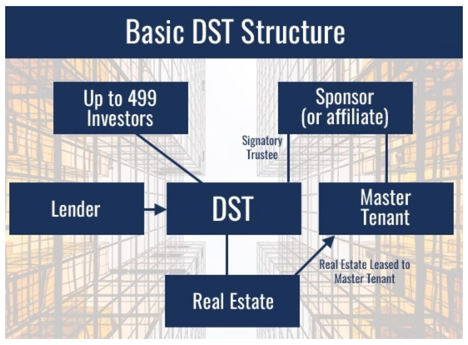
Investing in a Delaware Statutory Trust (DST) offers several potential advantages for investors. Here are some key advantages associated with investing in DSTs:
- Passive Ownership: DST investments allow investors to passively participate in real estate ownership. Investors can benefit from potential income and appreciation generated by the underlying property without the need for active management responsibilities. This can be particularly appealing to investors seeking a more hands-off approach to real estate investing.
- Potential Tax Advantages: DSTs can provide potential tax advantages, including the ability to defer capital gains taxes through a 1031 exchange. By reinvesting proceeds from the sale of a property into a DST, investors can defer the recognition of capital gains taxes that would typically be due upon the sale. This tax deferral can help investors preserve more of their investment capital and potentially enhance their overall returns.
- Diversification: Investing in DSTs allows investors to diversify their real estate holdings across different properties and markets. By participating in a DST portfolio that includes multiple properties, investors can spread their risk and potentially benefit from income and appreciation from a variety of real estate assets.
- Professional Management: DST investments are typically managed by experienced professionals or reputable real estate firms. These professionals handle the day-to-day property management, including leasing, maintenance, and operational decisions. Investors can benefit from the expertise and market knowledge of the DST sponsor, relieving them of the responsibilities associated with active property management.
- Access to Institutional-Quality Assets: DST investments often provide access to institutional-grade properties that may be difficult for individual investors to acquire on their own. These properties may include commercial real estate assets such as office buildings, retail centers, multifamily properties, or industrial complexes. Investing in high-quality assets can potentially enhance the stability and income potential of the investment.
- Lower Minimum Investment Requirements: DST investments typically have lower minimum investment requirements compared to direct real estate ownership. This can provide opportunities for investors with smaller amounts of capital to participate in real estate investments that may have been otherwise inaccessible to them.
- Reduced Liability Exposure: Investing in a DST can potentially limit an investor’s liability to the extent of their investment. Unlike direct ownership, where investors may be personally liable for the property’s debts or legal claims, DST investors generally have limited liability protection.

Unfortunately, investing in Delaware Statutory Trusts (DSTs) can have its share of challenges.
Here are some common challenges that investors may encounter when considering investments in DSTs:
- Limited Control: When investing in a DST, investors typically have limited control over the property and decision-making processes. The DST sponsor or manager retains control over the property’s management and operations, including decisions related to leasing, financing, and property improvements. This lack of control may not align with the preferences or investment strategies of some investors.
- Illiquidity: DST investments are generally illiquid, meaning they cannot be easily bought or sold on an open market. Unlike publicly traded securities, DST interests are typically held for a specified holding period, often several years. Early redemption options are limited or may not be available, which can restrict an investor’s ability to access their invested capital before the investment term ends.
- Limited Exit Strategies: Exiting a DST investment can be challenging due to the illiquid nature of the investment. Investors may need to rely on the DST sponsor’s ability to facilitate a sale or find a buyer for the property. The timing and availability of exit opportunities can be uncertain, potentially impacting an investor’s ability to realize their desired returns or access their funds when needed.
- Potential Lack of Diversification: Investing in a single DST property means that an investor’s capital is concentrated in a single asset. This lack of diversification can increase the investment’s risk profile, as the performance of the investment is tied to the success or failure of that particular property. Diversification across different asset classes or investment strategies may be limited within a DST structure.
- Risk of Property Underperformance: The performance of a DST investment depends heavily on the underlying property’s financial success. Factors such as market conditions, occupancy rates, rental income, property maintenance, and overall property management can significantly impact the investment’s returns. Investors should conduct thorough due diligence on the property and the DST sponsor’s track record to assess the potential risks involved.
- Limited Financing Options: Financing options for DST investments can be limited compared to traditional real estate investments. DSTs often have pre-arranged financing in place, and investors typically cannot secure individual loans against their DST interests. This lack of flexibility in financing options can restrict an investor’s ability to leverage their investment or take advantage of market opportunities.
- Complex Tax Considerations: While DSTs offer potential tax benefits, navigating the tax complexities associated with these investments can be challenging. Investors must understand the tax implications, such as the potential recapture of depreciation, passive income limitations, and potential unrelated business taxable income (UBTI) issues. Seeking guidance from tax professionals familiar with DST investments is essential to ensure proper tax planning and compliance.
It’s crucial for investors to carefully evaluate these challenges and assess whether they align with their investment goals, risk tolerance, and liquidity needs. Working with experienced professionals, conducting thorough due diligence, and understanding the specific terms and conditions of a DST investment are essential steps to mitigate potential challenges.
Looking to search DSTs for your next replacement property—start your search by completing our 5-minute wizard!






